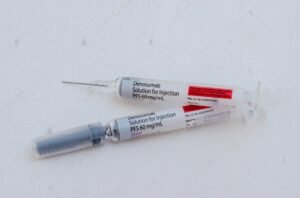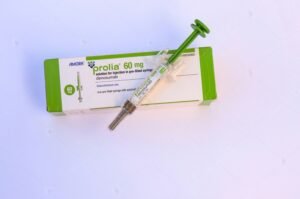What is a Denosumab?
Denosumab is a medication that can help with osteoporosis and other bone problems. It can also be used to treat cancer that has spread to your bones, by making them stronger and less likely to break. This medicine is given as a shot.
How Does Denosumab Work?
Denosumab helps to strengthen your bones. It does this by targeting a protein called RANKL, which is involved in controlling cells called osteoclasts. These osteoclasts are responsible for breaking down old bone tissue. By blocking RANKL, denosumab helps to prevent these cells from working too much. This reduces the rate at which old bone is broken down and allows your body to build new bone, ultimately making your bones stronger and denser.
How to Take Denosumab Injection?

Denosumab is usually given as a shot by your doctor or nurse. They will inject it under your skin (subcutaneously) in your upper arm, thigh, or belly. The typical dose is 60mg, and you’ll receive it every six months. We recommend taking calcium and vitamin D supplements along with Denosumab. Your doctor will advise you on the right dosage for these supplements.
What are the Side Effects of the Denosumab Injection?
As with any medication, denosumab may cause side effects, but these are generally rare. The most common side effects include:
Low blood calcium levels (hypocalcemia)
Skin problems such as dryness, peeling, redness, itching, small bumps, blisters, rash, dermatitis, eczema, or skin infections (cellulitis) at the injection site
Bone, joint, or muscle pain
- Jaw bone problems (osteonecrosis)
- Urinary tract infections
- Fatigue
- Diarrhea
- Constipation
- Abdominal pain
- Upper respiratory tract infections
- Nasopharyngitis
Serious infections, including skin, ear, stomach, bladder, or lung infections
Hypersensitivity or allergic reactions, including serious allergic reactions
Atypical (unusual) thigh bone fractures
Cataracts
Increased risk of broken bones after stopping treatment
What are the Warning and Precautions of Denosumab?

Pregnancy and breastfeeding: If you’re pregnant or planning to become pregnant, Denosumab is not recommended. It may cause harm to your baby. If you’re a woman who can get pregnant, we recommend using effective birth control while taking Denosumab and for at least 5 months after your last dose.
It’s also unknown if Denosumab passes into breast milk. Talk to your doctor before breastfeeding if you’re taking Denosumab. They can help you weigh the risks and benefits.
Allergic Reactions: While serious allergic reactions to Denosumab are uncommon, it’s important to be aware of the signs. These can include a rash, itching, swelling of your face, tongue, or throat, feeling very dizzy, or having trouble breathing. If you experience any of these symptoms after taking Denosumab, seek immediate medical attention.
Low Calcium Levels (Hypocalcemia): Denosumab can sometimes lower your calcium levels in the blood, especially if you have problems with your kidneys or a history of low calcium. To help prevent this, we recommend taking calcium and vitamin D supplements along with Denosumab, exactly as your doctor tells you.
Infections: Denosumab can affect your body’s immune system in a way that might increase your chances of getting infections. These infections could be in your skin, ears, stomach, bladder, or lungs. It’s important to be on the lookout for any signs of infection, such as fever, chills, or unusual pain. If you notice any of these, contact your doctor right away.
Jaw Bone Problems (Osteonecrosis): Denosumab can rarely cause problems with your jaw bone. This is more likely if you have cancer, certain blood disorders, pre-existing dental issues, or are taking medications like steroids, chemotherapy, or radiation. Signs of jaw problems can include jaw pain, numbness, redness or swelling in your gums, loose teeth, gum infections, or slow healing after dental work. To help prevent this, we recommend regular dental checkups and keeping up with good oral hygiene. Be sure to tell your doctor about any dental problems you have before starting Denosumab.
Bone Fractures after Discontinuing Denosumab: It’s important to talk to your doctor before stopping Denosumab. Pausing or delaying your Denosumab treatment can increase your risk of fractures, especially in your spine. We recommend working with your doctor to create a treatment plan that’s right for you. This may involve switching to a different medication to keep your bones strong.
Thigh Bone Fractures: Some patients have reported unusual fractures in their thigh bones while taking denosumab. New or unusual pain in the hip, groin, or thigh may be a symptom of this.
Denosumab may cause some other side effects, like:
Skin problems such as dryness, peeling, redness, itching, or even blisters
Muscle tightness or cramps
Pain or burning when you urinate, or needing to urinate more often or urgently
Severe stomach pain
Problems with your eyes or heart (these are rare)
People with Kidney Disease: If you have advanced kidney disease and are on dialysis, there’s an ongoing investigation into the risk of Denosumab potentially causing very low calcium levels in the blood. This can be serious and lead to hospitalization or even death. Doctors are aware of this and will take it into account when deciding if Denosumab is right for you. Be sure to talk to your doctor about your kidney function and any concerns you may have.
How Does Denosumab Interact with Other Medicines?
Denosumab can interact with certain medications. It’s always best to talk to your doctor or pharmacist before starting, stopping, or changing the dose of any medicine you take, including Denosumab.
While Denosumab doesn’t have any known severe interactions, there is one serious interaction to be aware of: the influenza virus vaccine trivalent, adjuvanted (flu shot with an adjuvant). There are also moderate interactions with over 100 other medications, including some common ones like Metoprolol (blood pressure medicine), Synthroid (thyroid medication), Tylenol (pain reliever), and vitamins B12 and C.
Even if a medication isn’t listed here, it’s still important to tell your doctor about all the medicines you take. This way, they can check for any potential interactions and make sure Denosumab is safe for you.
What Happens if I Miss a Dose of Denosumab?
Missing a Dose of Denosumab: If you forget your Denosumab injection, call your doctor as soon as possible. They can help you reschedule your missed dose and get you back on track. In general, you’ll receive the injection as soon as you can, and then keep your follow-up appointments every 6 months from the date of that last injection.
What Happens if I Overdose on Denosumab?
Denosumab is usually given by a doctor or nurse in a healthcare setting, so an overdose is unlikely. However, in very rare cases, an overdose may happen. If you think you or someone you know has accidentally taken too much Denosumab, call emergency services or your local poison control center right away.



